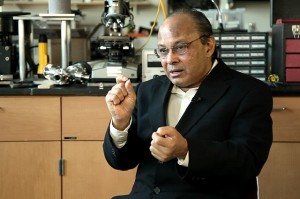Ice-like Phonons in Liquid Water Discovered
New research attempts to resolve the debate about water's structure
Is general relativity less affected by politics than particle physics? Does politics help fundamental science or it only interferes with its natural progress? Germeshausen Professor of the History of Science at Massachusetts Institute of Technology David Kaiser explains how war influences science.
Einstein’s General Relativity – to this day, a hundred years later, it remains physicists’ best explanation for the warping of space-time, the behavior of gravitation, it’s the premise for all of the thinking about the Big Bang, the universe and cosmology. It’s a gorgeous legacy from Albert Einstein. And it also seems that unlike nuclear physics we might think that it would have been least impacted by the politics of its day. This is not about nuclear weapons, or reactors, or power, it seems to be about the ethereal, the most otherworldly, the least about sort of the here and now. And so what’s been interesting to me as I’ve dug into its history over the last century is exactly how deeply embedded Einstein’s relativity has been in geopolitics.
Lincoln’s job was to design better and better radar systems actually to try to detect incoming Soviet missiles in the era after Sputnik. As it turns out very few Soviet missiles were coming at the United States, and by very few I mean – zero, as we now know, but they didn’t know that then, they were very worried. So this was part of a hair-trigger alert system to design better and better radars to scan the horizon, to look for a telltale sign of a missile that had just been launched and might be heading towards North America. Well, because there were few missiles to practice on coming over the horizon, somebody of these enterprising scientists that they can fine-tune every piece of equipment — the radars, the early room-sized computers, the programs, the whole thing by trying to send radar signals to the planets like Mercury and Venus and detect the echo.
So time and time again from the earliest moments of World War I right through the height of the Cold War we see tremendously important basic research on general relativity being conducted in a messy political world where the politics wasn’t necessarily making bad science, it was helping certain kinds of science thrive in sort of surprising ways. So even this most beautiful ethereal, otherworldly topic like Einstein’s relativity, it was tethered every moment to the vicissitudes, to the politics of the 20th century.

New research attempts to resolve the debate about water's structure

Physicist Jonathan Butterworth on the predictions of the Standard Model, new excitement about physics and futu...

Physicist Srinivas Sridhar on super resolution imaging, an entirely new way for light to propagate, and a brea...